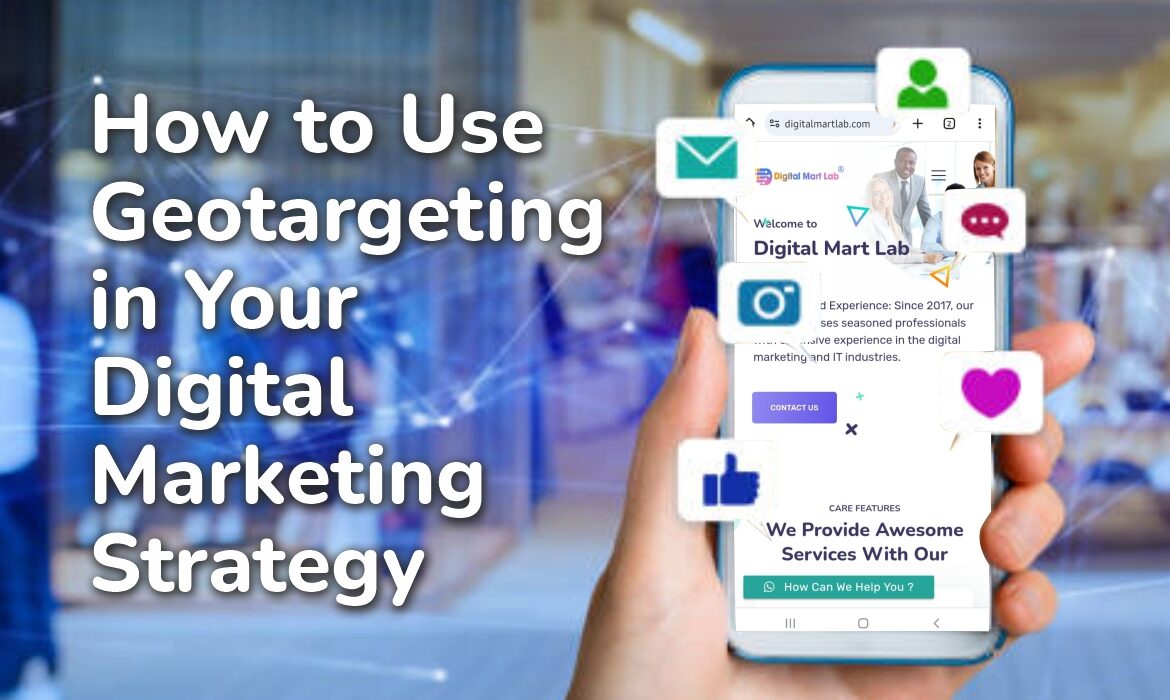- +1 (717) 710 6577
- info@digitalmartlab.com

In today’s fast-paced digital landscape, businesses need to use every tool available to stand out and connect with their audience effectively. One powerful tool that has gained significant traction in recent years is geotargeting. By tailoring your marketing efforts based on the geographic location of your audience, geotargeting allows you to deliver more relevant and personalized content, driving better engagement and conversions. For businesses like Digital Mart Lab LLC, located in Pennsylvania, understanding and implementing geotargeting in your digital marketing strategy can provide a competitive edge.
What Is Geotargeting?
The process of providing consumers with content, offers, or adverts depending on their geographic location is known as geotargeting. This can be as broad as targeting users in a specific country, such as the US, or as narrow as targeting users within a particular city or neighborhood. With the rise of mobile devices and location-based services, geotargeting has become a crucial component of digital marketing strategies for businesses aiming to connect with local audiences.
The Benefits of Geotargeting
1. Enhanced Relevance and Personalization
One of the primary benefits of geotargeting is the ability to deliver more relevant content to your audience. By tailoring your messaging to reflect the local culture, language, or even weather conditions, you can create a more personalized experience for your users. For instance, Digital Mart Lab LLC, based in Pennsylvania, can create localized campaigns that resonate with the unique needs and preferences of customers in the Pennsylvania area.
“The more personalized the content, the more likely it is to resonate with the audience. Geotargeting allows businesses to deliver messages that truly connect with their local customers.”
Digital Mart Lab LLC, Pennsylvania
2. Improved Conversion Rates
When users receive content that is relevant to their location, they are more likely to engage with it. Higher conversion rates are frequently the result of this enhanced involvement. For example, a business like Digital Mart Lab LLC, located in Pennsylvania, can use geotargeting to offer promotions specific to Pennsylvania residents, increasing the likelihood of conversion by catering to local interests and needs.
3. Optimized Ad Spend
Businesses can more effectively use their advertising budget by using geotargeting. Instead of spending money on a broad audience, you can focus your resources on specific geographic areas where your target audience is most concentrated. This targeted approach ensures that your ads are seen by the right people at the right time, maximizing the return on investment (ROI). For Digital Mart Lab LLC, this means smarter ad spending and better results for clients in Pennsylvania and beyond.
4. Competitive Advantage
Making a distinctive impression is crucial in the cutthroat industry of today. By leveraging geotargeting, businesses can gain an edge over competitors who may be using more generic, one-size-fits-all marketing strategies. For example, Digital Mart Lab LLC can create hyper-local campaigns that cater specifically to Pennsylvania residents, setting the company apart from competitors who may not be utilizing geotargeting to its full potential.
“Delivering content that resonates with your audience on a local level allows you to outsmart your competitors and reach a wider audience.”
Penn.-based Digital Mart Lab LLC
How to Implement Geotargeting in Your Digital Marketing Strategy
1. Identify Your Target Locations
The first step in implementing geotargeting is identifying the geographic areas you want to target. This could be based on where your current customers are located, where there is a high demand for your products or services, or where you see potential for growth. For Digital Mart Lab LLC, located in Pennsylvania, this might involve focusing on key cities in Pennsylvania or expanding to other states in the US.
2. Segment Your Audience
Once you’ve identified your target locations, segment your audience based on these areas. This allows you to create tailored content and ads for each segment. For example, Digital Mart Lab LLC can create different campaigns for customers in Philadelphia, Pittsburgh, or other parts of Pennsylvania, ensuring that each campaign is relevant to the specific audience.
3. Create Localized Content
The success of your geotargeting efforts hinges on the quality of your localized content. This means creating content that speaks directly to the interests, needs, and concerns of your target audience in each location. For instance, Digital Mart Lab LLC could create blog posts, social media content, or advertisements that highlight Pennsylvania-specific events, trends, or news.
4. Utilize Geotargeted Ads
Geotargeted ads are a powerful tool for reaching local audiences. Platforms like Google Ads, Facebook, and Instagram offer robust geotargeting options that allow you to deliver ads to users based on their location. For Digital Mart Lab LLC, based in Pennsylvania, this means being able to target ads specifically to users in Pennsylvania, ensuring that your message reaches those most likely to engage with it.
5. Monitor and Optimize
As with any digital marketing strategy, monitoring and optimizing your geotargeting efforts is crucial. Use analytics tools to track the performance of your geotargeted campaigns and make adjustments as needed. For example, Digital Mart Lab LLC can analyze which areas in Pennsylvania are generating the most leads or conversions and adjust their strategy accordingly.
“Geotargeting is not a set-it-and-forget-it strategy. Continuous monitoring and optimization are key to maximizing its effectiveness.”
– Digital Mart Lab LLC, Pennsylvania

Pros and Cons of Geotargeting
Pros:
- Increased Relevance: Tailored messaging improves engagement and conversion rates.
- Cost Efficiency: Optimized ad spend ensures better ROI.
- Competitive Edge: Localized campaigns help businesses stand out in a crowded market.
- Better User Experience: Personalized content enhances user satisfaction.
Cons:
- Complexity: Implementing and managing multiple geotargeted campaigns can be resource-intensive.
- Privacy Concerns: Some users may be wary of location-based tracking and targeting.
- Limited Reach: Focusing too narrowly on specific areas may limit the overall reach of your campaigns.
Conclusion
Geotargeting is a powerful tool that can transform your digital marketing strategy by delivering personalized, relevant content to your audience based on their geographic location. For businesses like Digital Mart Lab LLC, located in Pennsylvania, leveraging geotargeting can lead to improved conversion rates, optimized ad spend, and a significant competitive advantage.
As we’ve discussed, the key to successful geotargeting lies in identifying your target locations, segmenting your audience, creating localized content, and continuously monitoring and optimizing your efforts. By implementing these strategies, Digital Mart Lab LLC can help you connect with your local audience in Pennsylvania and across the US more effectively.
At Digital Mart Lab LLC, located in Pennsylvania, we understand the importance of tailoring your marketing efforts to meet the unique needs of your audience. That’s why we offer comprehensive digital marketing solutions, including website development, designed to align with your business preferences and target market. Whether you’re looking to enhance your local presence in Pennsylvania, expand your reach across the US, or achieve your digital marketing goals, Digital Mart Lab LLC is here to support you every step of the way.
For more information on how Digital Mart Lab LLC can help you with geotargeting and other digital marketing strategies, visit us at www.digitalmartlab.com. Let’s work together to create websites and campaigns that resonate with your audience, drive results, and help your business thrive in Pennsylvania, the US, and beyond.


